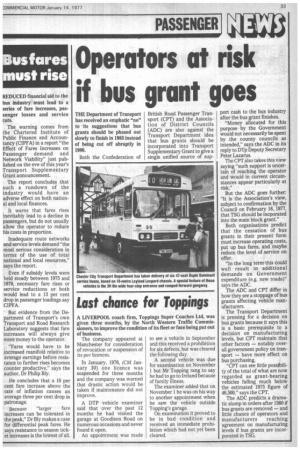Operators at risk if bus grant goes
Page 35

If you've noticed an error in this article please click here to report it so we can fix it.
REDUCED financial aid to the bus industry must lead to a series of fare increases, passenger losses and service cuts.
The warning comes from the Chartered Institute of Public Finance and Accountancy (CIPFA) in a report "the Effect of Fares Increases on Passenger demand and Network Viability" just published on the eve of this year's Transport Supplementary Grant announcement.
The report concludes that such a rundown of the industry would have an adverse effect on both national and local finances.
It warns that fares rises inevitably lead to a decline in passengers, but do not usually allow the operator to reduce his costs in proportion.
Inadequate route networks and service levels demand "the most serious consideration in terms of the use of total national and local resources," says the report.
Even if subsidy levels were held steady between 1975 and 1979, necessary fare rises or service reductions or both would lead to a 13 per cent drop in passenger loadings say CIPFA.
But evidence from the Department of Transport's own Transport and Road Research Laboratory suggests that fare increases will always give more money to the operator.
"Fares would have to be increased manifold relative to average earnings before resistance to further rises becomes counter productive," says the author, Dr Philip Bly.
He concludes that a 10 per cent fare increase above the rate of inflation causes an average three per cent drop in patronage.
Because "larger fare increases can be tolerated in the peak," Dr Bly makes a case for differential peak fares. He Says resistance to season ticket increases is the lowest of all. THE Department of Transport has received an emphatic "no" to its suggestions that bus grants should be phased out slowly to finish in 1983 instead of being cut off abruptly in 1980. British Road Passenger Transport (CPT) and the Association of District Councils (ADC) are also against the Transport Department idea that bus grants should be incorporated into Transport Supplementary Grant to give a single unified source of sup port cash to the bus industry after the bus grant finishes.
"Money allocated for this purpose by the Government would not necessarily be spent by the county councils as intended," says the ADC in its reply to DTp Deputy Secretary Peter Lazarus.
The CPT also takes this view saying "such support is uncertain of reaching the operator and would in current circumstances appear particularly at risk."
But the ADC goes further: "It is the Association's view, subject to confirmation by the Council on February 16, 1977, that TSG should be incporated into the main block grant."
Both organisations predict that the cessation of bus grants in their present form must increase operating costs, put up bus fares, and maybe reduce the level of service on offer.
"In the long term this could well result in additional demands on Government expenditure (e.g. new roads)" says the ADC.
The ADC and CPT differ in how they see a stoppage of bus grants affecting vehicle manufacturers.
The Transport Department is pressing for a decision on bus grants because it says this is a basic prerequisite to a decision on manufacturing levels, but CPT maintain that other factors — notably overall government policy on transport — have more effect on bus purchasing.
"CPT can see little possibility of the total of what are now regarded as grant-bearing vehicles falling much below the estimated 1975 figure of 46,500," says the CPT.
The ADC predicts a dramatic slump in orders after 1980 if bus grants are removed — and little chance of operators and manufacturers reaching agreement on manufacturing levels if bus grants are incorporated in TSG.








































































































